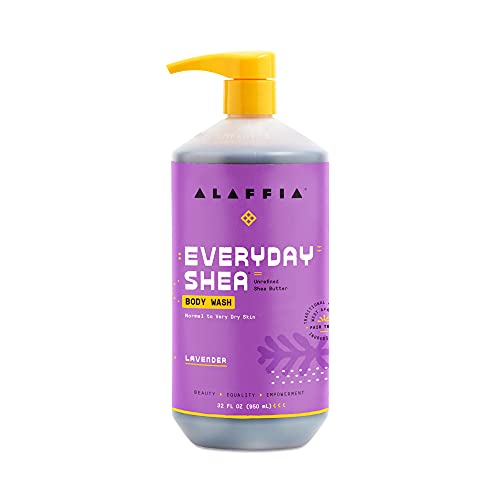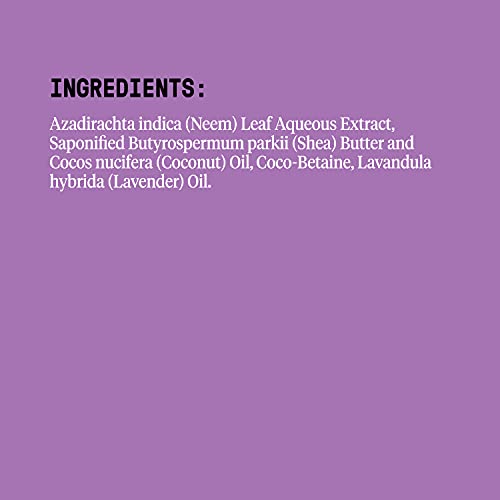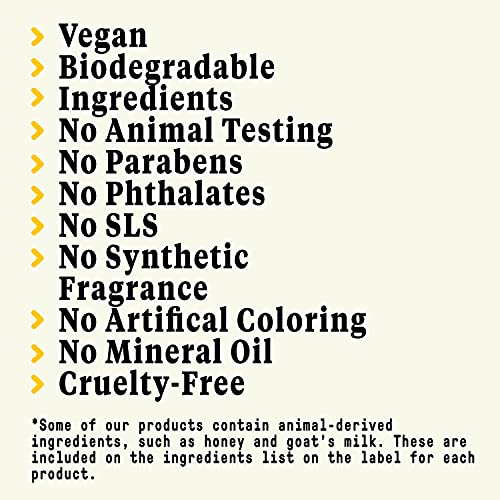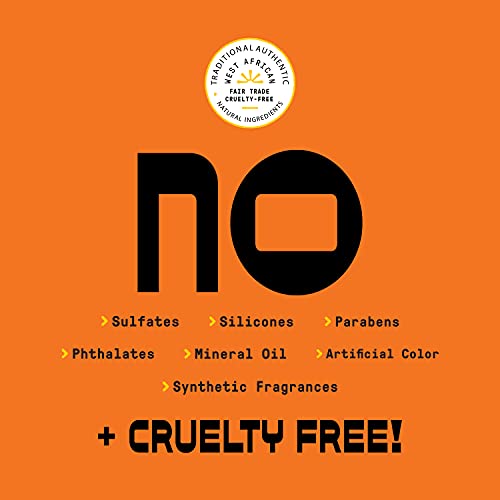





Alaffia EveryDay Shea Body Wash - Moisturizes & Cleanses with Fair Trade Shea Butter - 32 Fl Oz


Cocamidopropyl Betaine
High RiskCocamidopropyl betaine is a synthetic surfactant derived from coconut oil, commonly used in personal care products for its mild cleansing and foaming properties. It functions as a surfactant, emulsifier, and thickening agent, contributing to the texture and performance of formulations.
Sustai Insights
Cocamidopropyl betaine offers functional benefits as a gentle surfactant, enhancing product foaming and texture. However, it may pose low to moderate allergenic risks and is subject to high use restrictions due to contamination concerns. Regulatory bodies have advised on its safe levels of usage, categorizing its risk level as high overall. Users should practice caution, particularly with sensitive populations, and consider alternatives like naturally derived surfactants for safer formulations.
Lavandula Hybrida Oil
Low RiskLavandula hybrida oil is an essential oil obtained from the hybrid lavender plant, known for its aromatic properties and use in various cosmetic and therapeutic applications. It is commonly used for its fragrance and potential calming effects in personal care products.
Sustai Insights
Lavandula hybrida oil offers functional benefits as a fragrance and may have mild calming effects. It is sustainably sourced and typically presents low risks for carcinogenicity, allergies, and reproductive toxicity. However, it carries low to moderate concerns about endocrine disruption. Environmental impacts are minimal, and it is not currently subject to significant regulatory restrictions. Overall, the risk level associated with this ingredient is low, making it a relatively safe option in product formulations.
Saponified Butyrospermum Parkii (Shea Butter)
Low RiskSaponified Butyrospermum Parkii (Shea Butter) is derived from the nuts of the shea tree. It functions primarily as a moisturizer in cosmetic formulations, providing emollient properties that help to soften and hydrate the skin.
Sustai Insights
Saponified Butyrospermum Parkii offers effective moisturizing benefits and is typically sustainably sourced, contributing to its positive sustainability profile. Health impacts are minimal, with low concerns regarding carcinogenicity, allergies, and reproductive toxicity. Environmental risks are also low, with no significant pollutant or bioaccumulation concerns. Regulatory status is favorable, with no current restrictions. Overall, the ingredient is assessed as low risk, making it a suitable choice for various applications.
Saponified Azadirachta Indica (Neem) Oil
Low RiskSaponified Azadirachta Indica (neem) oil is derived from the neem tree, commonly used in cosmetics and personal care products. It serves as a natural emulsifier and has moisturizing properties, contributing to product stability and skin hydration.
Sustai Insights
Saponified neem oil offers functional benefits as a natural emulsifier and skin conditioner, with sustainability credentials due to its biodegradable nature and renewable sourcing. Health risks are minimal, with low concerns for carcinogenicity, allergies, and reproductive toxicity. Environmental impacts are also low, with no significant pollution or bioaccumulation concerns. Regulatory bodies do not impose restrictions, classifying it as low risk overall. For safe usage, it is recommended to follow product guidelines, and alternatives may include other natural oils like coconut oil for similar benefits.
Hydrogenated Coconut Oil
Low RiskHydrogenated coconut oil is an end product of the hydrogenation process, where coconut oil is chemically altered to enhance its stability and shelf-life. It serves primarily as an emollient and thickening agent in cosmetic formulations, providing a smooth texture and moisturizing properties.
Sustai Insights
Hydrogenated coconut oil offers functional benefits as a moisturizing agent and stabilizer in formulations. It is generally recognized as safe with low risks for cancer, allergies, and reproductive toxicity, according to the Cosmetic Ingredient Review (CIR). Environmental impacts are minimal, with no significant pollutant potential. Regulatory bodies have not issued advisories against its use. Overall, the ingredient presents a low risk profile, making it a suitable choice in cosmetic products. For those seeking alternatives, natural oils or non-hydrogenated variants may be considered.
Hydrogenated Coconut Oil
Low RiskHydrogenated coconut oil is an end product of the hydrogenation process, where coconut oil is chemically altered to enhance its stability and shelf-life. It serves primarily as an emollient and thickening agent in cosmetic formulations, providing a smooth texture and moisturizing properties.
Sustai Insights
Hydrogenated coconut oil offers functional benefits as a moisturizing agent and stabilizer in formulations. It is generally recognized as safe with low risks for cancer, allergies, and reproductive toxicity, according to the Cosmetic Ingredient Review (CIR). Environmental impacts are minimal, with no significant pollutant potential. Regulatory bodies have not issued advisories against its use. Overall, the ingredient presents a low risk profile, making it a suitable choice in cosmetic products. For those seeking alternatives, natural oils or non-hydrogenated variants may be considered.
Hydrogenated Coconut Oil
Low RiskHydrogenated coconut oil is an end product of the hydrogenation process, where coconut oil is chemically altered to enhance its stability and shelf-life. It serves primarily as an emollient and thickening agent in cosmetic formulations, providing a smooth texture and moisturizing properties.
Sustai Insights
Hydrogenated coconut oil offers functional benefits as a moisturizing agent and stabilizer in formulations. It is generally recognized as safe with low risks for cancer, allergies, and reproductive toxicity, according to the Cosmetic Ingredient Review (CIR). Environmental impacts are minimal, with no significant pollutant potential. Regulatory bodies have not issued advisories against its use. Overall, the ingredient presents a low risk profile, making it a suitable choice in cosmetic products. For those seeking alternatives, natural oils or non-hydrogenated variants may be considered.
Water
Low RiskWater is a clear, colorless liquid essential for various biological processes. It serves as a solvent in formulations, facilitating the dissolution of other ingredients and enhancing product texture and application. Additionally, water plays a crucial role in hydration and is a key component in many cosmetic and personal care products.
Sustai Insights
Water is an effective solvent and hydrator, contributing to the texture and efficacy of formulations. It is biodegradable and generally regarded as safe, with low concerns regarding carcinogenicity, allergies, and reproductive toxicity. However, excessive water usage can lead to environmental concerns, particularly regarding resource depletion. Regulatory bodies do not impose restrictions on water use in cosmetics. Overall, the risks associated with water are low, making it a safe and essential ingredient.
Sodium Chloride
Low RiskSodium chloride is an inorganic salt commonly known as table salt. It is primarily used in food preservation and flavor enhancement, as well as in various industrial applications. It exists as a crystalline solid and dissolves easily in water, making it effective for diverse uses in food products and other formulations.
Sustai Insights
Sodium chloride serves essential functions in food preservation and flavor enhancement. It is considered safe with low health risks related to cancer, allergies, and reproductive toxicity. Environmental concerns are minimal, as it does not bioaccumulate and poses low pollutant potential. Regulatory bodies, including the FDA, recognize its safety for consumption. Overall, sodium chloride carries a low risk profile, making it a widely accepted ingredient in food and cosmetic products.
Lavandula Hybrida Oil
Low RiskLavandula hybrida oil is an essential oil obtained from the hybrid lavender plant, known for its aromatic properties and use in various cosmetic and therapeutic applications. It is commonly used for its fragrance and potential calming effects in personal care products.
Sustai Insights
Lavandula hybrida oil offers functional benefits as a fragrance and may have mild calming effects. It is sustainably sourced and typically presents low risks for carcinogenicity, allergies, and reproductive toxicity. However, it carries low to moderate concerns about endocrine disruption. Environmental impacts are minimal, and it is not currently subject to significant regulatory restrictions. Overall, the risk level associated with this ingredient is low, making it a relatively safe option in product formulations.
Saponified Butyrospermum Parkii (Shea Butter)
Low RiskSaponified Butyrospermum Parkii (Shea Butter) is derived from the nuts of the shea tree. It functions primarily as a moisturizer in cosmetic formulations, providing emollient properties that help to soften and hydrate the skin.
Sustai Insights
Saponified Butyrospermum Parkii offers effective moisturizing benefits and is typically sustainably sourced, contributing to its positive sustainability profile. Health impacts are minimal, with low concerns regarding carcinogenicity, allergies, and reproductive toxicity. Environmental risks are also low, with no significant pollutant or bioaccumulation concerns. Regulatory status is favorable, with no current restrictions. Overall, the ingredient is assessed as low risk, making it a suitable choice for various applications.
Saponified Azadirachta Indica (Neem) Oil
Low RiskSaponified Azadirachta Indica (neem) oil is derived from the neem tree, commonly used in cosmetics and personal care products. It serves as a natural emulsifier and has moisturizing properties, contributing to product stability and skin hydration.
Sustai Insights
Saponified neem oil offers functional benefits as a natural emulsifier and skin conditioner, with sustainability credentials due to its biodegradable nature and renewable sourcing. Health risks are minimal, with low concerns for carcinogenicity, allergies, and reproductive toxicity. Environmental impacts are also low, with no significant pollution or bioaccumulation concerns. Regulatory bodies do not impose restrictions, classifying it as low risk overall. For safe usage, it is recommended to follow product guidelines, and alternatives may include other natural oils like coconut oil for similar benefits.
Hydrogenated Coconut Oil
Low RiskHydrogenated coconut oil is an end product of the hydrogenation process, where coconut oil is chemically altered to enhance its stability and shelf-life. It serves primarily as an emollient and thickening agent in cosmetic formulations, providing a smooth texture and moisturizing properties.
Sustai Insights
Hydrogenated coconut oil offers functional benefits as a moisturizing agent and stabilizer in formulations. It is generally recognized as safe with low risks for cancer, allergies, and reproductive toxicity, according to the Cosmetic Ingredient Review (CIR). Environmental impacts are minimal, with no significant pollutant potential. Regulatory bodies have not issued advisories against its use. Overall, the ingredient presents a low risk profile, making it a suitable choice in cosmetic products. For those seeking alternatives, natural oils or non-hydrogenated variants may be considered.
Hydrogenated Coconut Oil
Low RiskHydrogenated coconut oil is an end product of the hydrogenation process, where coconut oil is chemically altered to enhance its stability and shelf-life. It serves primarily as an emollient and thickening agent in cosmetic formulations, providing a smooth texture and moisturizing properties.
Sustai Insights
Hydrogenated coconut oil offers functional benefits as a moisturizing agent and stabilizer in formulations. It is generally recognized as safe with low risks for cancer, allergies, and reproductive toxicity, according to the Cosmetic Ingredient Review (CIR). Environmental impacts are minimal, with no significant pollutant potential. Regulatory bodies have not issued advisories against its use. Overall, the ingredient presents a low risk profile, making it a suitable choice in cosmetic products. For those seeking alternatives, natural oils or non-hydrogenated variants may be considered.
Hydrogenated Coconut Oil
Low RiskHydrogenated coconut oil is an end product of the hydrogenation process, where coconut oil is chemically altered to enhance its stability and shelf-life. It serves primarily as an emollient and thickening agent in cosmetic formulations, providing a smooth texture and moisturizing properties.
Sustai Insights
Hydrogenated coconut oil offers functional benefits as a moisturizing agent and stabilizer in formulations. It is generally recognized as safe with low risks for cancer, allergies, and reproductive toxicity, according to the Cosmetic Ingredient Review (CIR). Environmental impacts are minimal, with no significant pollutant potential. Regulatory bodies have not issued advisories against its use. Overall, the ingredient presents a low risk profile, making it a suitable choice in cosmetic products. For those seeking alternatives, natural oils or non-hydrogenated variants may be considered.
Water
Low RiskWater is a clear, colorless liquid essential for various biological processes. It serves as a solvent in formulations, facilitating the dissolution of other ingredients and enhancing product texture and application. Additionally, water plays a crucial role in hydration and is a key component in many cosmetic and personal care products.
Sustai Insights
Water is an effective solvent and hydrator, contributing to the texture and efficacy of formulations. It is biodegradable and generally regarded as safe, with low concerns regarding carcinogenicity, allergies, and reproductive toxicity. However, excessive water usage can lead to environmental concerns, particularly regarding resource depletion. Regulatory bodies do not impose restrictions on water use in cosmetics. Overall, the risks associated with water are low, making it a safe and essential ingredient.
Sodium Chloride
Low RiskSodium chloride is an inorganic salt commonly known as table salt. It is primarily used in food preservation and flavor enhancement, as well as in various industrial applications. It exists as a crystalline solid and dissolves easily in water, making it effective for diverse uses in food products and other formulations.
Sustai Insights
Sodium chloride serves essential functions in food preservation and flavor enhancement. It is considered safe with low health risks related to cancer, allergies, and reproductive toxicity. Environmental concerns are minimal, as it does not bioaccumulate and poses low pollutant potential. Regulatory bodies, including the FDA, recognize its safety for consumption. Overall, sodium chloride carries a low risk profile, making it a widely accepted ingredient in food and cosmetic products.
Cocamidopropyl Betaine
High RiskCocamidopropyl betaine is a synthetic surfactant derived from coconut oil, commonly used in personal care products for its mild cleansing and foaming properties. It functions as a surfactant, emulsifier, and thickening agent, contributing to the texture and performance of formulations.
Sustai Insights
Cocamidopropyl betaine offers functional benefits as a gentle surfactant, enhancing product foaming and texture. However, it may pose low to moderate allergenic risks and is subject to high use restrictions due to contamination concerns. Regulatory bodies have advised on its safe levels of usage, categorizing its risk level as high overall. Users should practice caution, particularly with sensitive populations, and consider alternatives like naturally derived surfactants for safer formulations.
Experience the luxurious Alaffia EveryDay Shea Body Wash, a sulfate-free cleanser designed to nourish and hydrate your skin. Infused with fair-trade unrefined shea butter, neem extract, and virgin coconut oil, this body wash not only cleanses but also revitalizes dull, dry skin for a radiant glow.
- Gentle Cleansing: Formulated to cleanse without stripping natural oils, this body wash is perfect for normal to very dry skin, ensuring your skin feels soft and refreshed.
- Moisturizing Benefits: The rich blend of shea butter and coconut oil deeply moisturizes, leaving your skin feeling silky smooth after every shower.
- Calming Lavender Aroma: Enjoy a soothing spa-like experience with the calming scent of lavender, promoting relaxation during your daily routine.
- Ethically Sourced Ingredients: Made with fair-trade components, Alaffia supports sustainable practices and empowers women in West Africa, fostering community growth.
- Free from Harsh Chemicals: This body wash is free from sulfates, parabens, and artificial fragrances, making it a safe choice for health-conscious consumers.
Embrace a cleaner, greener lifestyle with Alaffia EveryDay Shea Body Wash, where every purchase contributes to a better world.
Subscribe & Save with Sustai
- Best Price Guarantee: Always enjoy the lowest prices on sustainable home essentials.
- No Surprises: We’ll notify you before shipping. No hidden fees, ever.
- You’re in Charge: Change, pause, or cancel your subscription anytime with ease.
- Eco-Friendly Deliveries: Our grouped shipments mean less packaging and lower emissions.
Join us on a sustainable journey. Special offers for a limited time! Prices and promotions may change.
Recommended Products
Experience the luxurious Alaffia EveryDay Shea Body Wash, a sulfate-free cleanser designed to nourish and hydrate your skin. Infused with fair-trade unrefined shea butter, neem extract, and virgin coconut oil, this body wash not only cleanses but also revitalizes dull, dry skin for a radiant glow.
- Gentle Cleansing: Formulated to cleanse without stripping natural oils, this body wash is perfect for normal to very dry skin, ensuring your skin feels soft and refreshed.
- Moisturizing Benefits: The rich blend of shea butter and coconut oil deeply moisturizes, leaving your skin feeling silky smooth after every shower.
- Calming Lavender Aroma: Enjoy a soothing spa-like experience with the calming scent of lavender, promoting relaxation during your daily routine.
- Ethically Sourced Ingredients: Made with fair-trade components, Alaffia supports sustainable practices and empowers women in West Africa, fostering community growth.
- Free from Harsh Chemicals: This body wash is free from sulfates, parabens, and artificial fragrances, making it a safe choice for health-conscious consumers.
Embrace a cleaner, greener lifestyle with Alaffia EveryDay Shea Body Wash, where every purchase contributes to a better world.

You can have at most 2 Sustainable Steals products in your cart
Customer Reviews
Customers’ View
Customers appreciate the gentle cleansing and moisturizing properties of this body wash, highlighting its effectiveness for various skin types, including sensitive and dry skin. Many users note that the product leaves their skin feeling soft and clean without drying it out, with comments like, "It doesn’t leave me feeling slick or dry" and "great for itchy and sensitive skin." The natural ingredients, including fair-trade shea butter and neem, resonate well with health-conscious consumers, with several reviews praising the absence of synthetic fragrances and harmful chemicals. Additionally, the relaxing lavender scent enhances the shower experience, creating a spa-like atmosphere in the bathroom. While some users have raised concerns about the pump functionality, the overall sentiment is positive, with many finding the product to be both effective and aligned with their eco-friendly values.
AI-generated from the text of customer reviewsThis product has no reviews yet.




